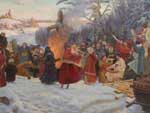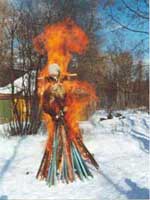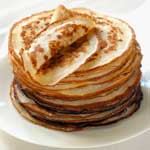Maslenitsa, also known as Butter Week, Pancake week, or Cheesefare Week, the Russian religious and folk holiday

Maslenitsa begins. Painting by Boris Kustodyev.
Maslenitsa
Perhaps the most cheerful holiday in Russia is Maslenitsa (Shrovetide). This holiday is considered to come from pre-Christian times, when the Slavs were still pagans.
In the old days Maslenitsa was for remembrance of the dead. So the burning of the figure of Maslenitsa means her funeral, and blini (pancakes) – coliphia. But with time the Russians longing for fun and entertainment turned the sad holiday into jolly Maslenitsa with blini – round, yellow and hot as the sun, sledding and horse sleigh riding, fistfights and mother-in-law chatting. The rituals of Maslenitsa are very unusual and interesting because they combine the end of the winter holiday rituals and the opening of new spring festivals and ceremonies, which were to promote a rich harvest.
Maslenitsa is celebrated during the week preceding the Lent or the 7th week before Russian Orthodox Easter (Pascha). Every day of Maslenitsa was devoted to special rituals.
Monday
Maslenitsa.
ChucheloMonday is “Vstrecha” – “Meeting”. On that day people made the straw-stuffed figure of Winter, dressed it in old women’s clothing and singing carried it on sleigh around the village. Then the figure was put onto snow-covered slope that people used for tobogganing, which was considered not just fun, but the ancient rite, because it was thought that the one who came down the hill more than once was likely to have tall flax in summer.

Tuesday is “Zaigryshi” which can roughly be translated as “games”. From that day on the whole village started all sorts of activities: sleigh riding, folk festivals, skomorokh (traveling actors) and puppet shows. The streets were full of people in carnival costumes and masks, who visited homes of their neighbours and organised impromptu concerts. Large groups of people rode troikas and simple sleighs.
Pancake Week in 18th century Moscow was hard to imagine without bear shows. Bear fun was very popular among all classes of the population of towns and cities, towns, and villages. Trained bears amused the audience, imitating girls putting makeup are in front of the mirror or women baking pancakes.
Wednesday
Maslenitsa. PancakesWednesday is “Lakomki” – “gourmands” - opened feasts in houses with blini and other dishes. Each household had tables with delicious food, baked pancakes, and brewed beer. Tents selling all kinds of food appeared everywhere. They sold hot sbiten (drinks from water, honey and spices), nuts, honey gingerbreads and poured tea from boiling samovars.
 |
| Ivorymammoth at the English language Wikipedia |
Thursday is called “Shirokii razgul” which means “show time” or “revelry”!” It was then that the hottest fistfights took place.

If on Wednesday sons-in-law were treated with pancakes in their mothers-in-law homes, on Friday it was their turn to arrange evenings with blini. On the day before mothers-in-law had to send to their sons-in-law homes everything necessary for blini making: pans, ladles etc., and fathers-in-law sent a bag of buckwheat and some butter. The disrespect of the tradition from the part of a son-in-law was considered dishonor and insult; it was a reason for life-long enmity.

Saturday
Saturday is “Zolovkiny posidelki” – newlywed wives visit their sisters-in-law, and bring them some gifts.
Sunday
Sunday is *the* most important day of all - “The Forgiven or Forgiveness Sunday”. On that day people asked each other for forgiveness for all grievances and troubles; in the evening people went to cemeteries and “bid farewell” to the dead. On the last day of Maslenitsa comes the most interesting event – saying goodbye to Maslenitsa – a solemn burning of the stuffed figure of winter. People threw the remnants of pancakes and food to the huge bonfire explaining their children that all the nourishing food disappeared in fire to prepare them for the Lent.
 |
| К. Крыжановский Масленица. Прощеный день в крестьянской семье (гравюра по рисунку Н.И. Соколова) |
Maslenitsa ended with the first day of the Lent – Clean Monday, which was considered the day of purification from sin and fast forbidden food. On Clean Monday people usually washed in a bath; women washed dishes, cleaning them from grease and remains of forbidden food.
Get ready – everyone will be asking you to forgive them. In that case, you must answer “Bog prostit – i ya proschau”, which means “God will forgive – and I do, as well”
Oh, and don’t forget to ask for forgiveness by yourself – that way, you’ll enter Great Lent completely cleansed!
On Sunday, Lady Maslenitsa figurine gets burned, and her ashes thrown on the soil to fertilize it – that way we’ll be sure the spring is finally coming!
 |
| Л. И. Соломаткин. Масленица (Ну и масленица!). 1878 |
http://www.russianchurchcheltenham.org.uk/2014/02/maslenitsa-or-cheesefare-week-prelude-to-great-lent/
No comments:
Post a Comment